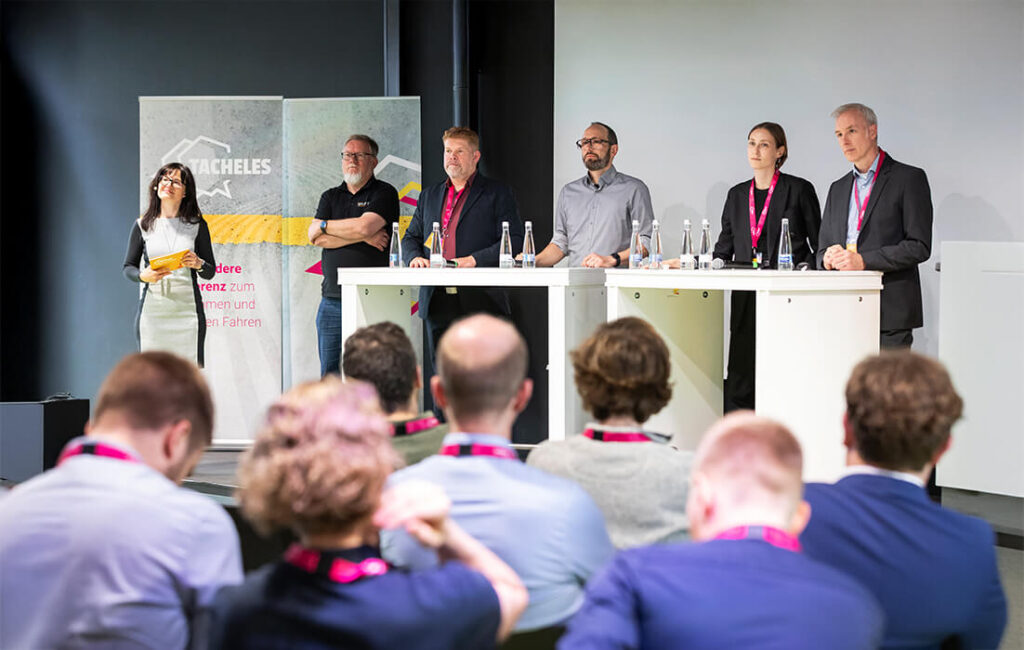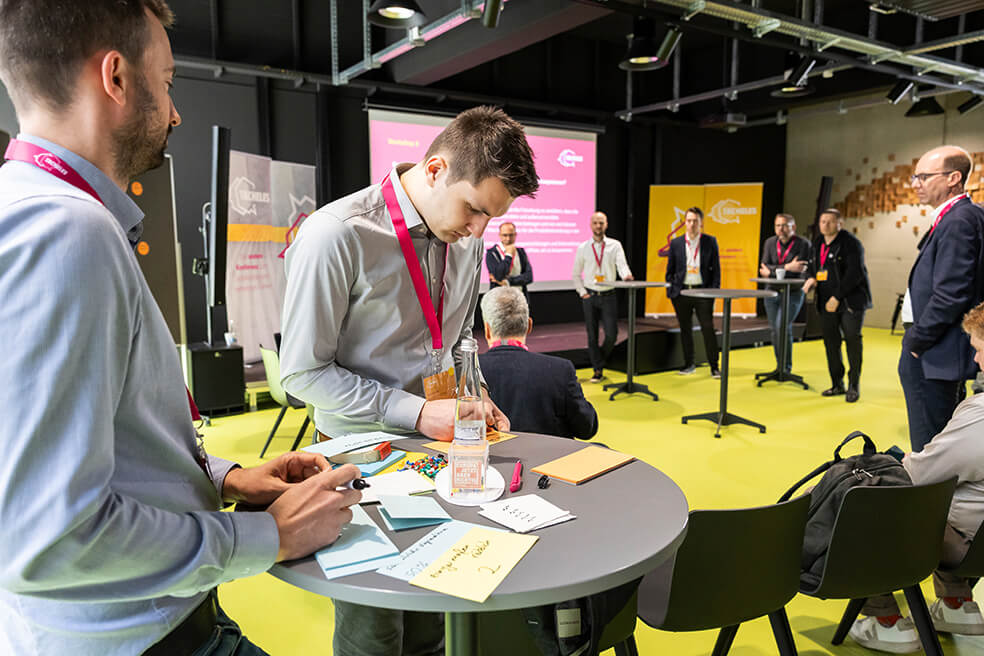TACHELES 2025
All Open – All In? Source, Data, Coopetition for Autonomous Driving
Research Focus: Intelligent Transportation Systems and Logistics
Open source and open data were our topics this year – openness in technology, in data, and in how we interact with each other. This openness was evident in the discussions: honest, controversial, inspiring. These are characteristic qualities of the event series, which took place under the patronage of the Baden-Württemberg Ministry of Transport and in partnership with KAMO: Karlsruhe Mobility High Performance Center.
Under the patronage of the Baden-Württemberg Ministry of Transport and in partnership with KAMO: Karlsruhe Mobility High Performance Center, we discussed open source and open data in autonomous and connected driving – the opportunities, risks, and concrete solutions.
- What does the open source/open data approach mean for competition in the automotive industry?
- What competitive differentiators will become relevant when everyone is using the same source material?
- What opportunities arise for AI development?
- What do business models look like?
- Are the players entering into new dependencies, and what does “open” mean in legal terms?
The open approach was explored at the conference with excellent representatives from industry and science. Experts and around 100 conference participants exchanged views on the pros and cons, discussed the existing gaps in knowledge and technology, grappled with the different interests of industry and science, and nevertheless developed new ideas together.
Cooperation as the key to the software-defined vehicle
How and to what extent these players can cooperate in software development for autonomous driving will still be the subject of much discussion after this year’s TACHELES conference. There is still a great deal of apprehension and reservations on the part of industry, and the ideas of the open source community seem incompatible with the development realities in large corporations. Nevertheless, both sides know that a joint approach would be desirable and sensible because resources are finite. At the same time, technology development and innovation requirements are enormous if significant progress is to be made in autonomous driving. This is an ideal starting point for TACHELES, the conference format that has openly addressed and controversially discussed the difficult issues surrounding autonomous and connected driving for three years.
Open source meets the great legacy of the automotive industry
How much standardization is needed to develop viable business models based on open source software solutions that can still meet the high, especially safety-related, requirements of the automotive world? This was the initial question posed by René Großpietsch, who opened the conference with his keynote speech as a representative of ASAM (Association for Standardization of Automation and Measuring Systems), an organization founded by the automotive industry. Michale Pöhnl from APEX.AI then presented Eclipse Iceoryx, an open source solution developed under the umbrella of Eclipse Foundation. The idea was to provide automotive manufacturers and tier 1 suppliers with a licensed open source software stack that fully meets their requirements. In practice, the business model is still struggling to break through, partly because the culture and mindset in automotive companies are not (yet) comfortable with it, and partly because breaking with existing paths represents a greater investment in many respects. The concluding presentation by Dirk Weihrauch and Jan Wildeboer from Red Hat again highlighted the different development worlds. However, from the perspective of one of the major open source development companies, the presentation also highlighted the enormous opportunities associated with open source. The credo here is that there is basically no need for proprietary solutions. Instead, the complexity of AVF requirements can only be managed in the future with reasonable effort by opening up. Communication, a willingness to cooperate, and a mindset that allows for change are essential.
In the subsequent panel discussion, which was rounded off by the legal expertise of Prof. Paulina Pesch from the Friedrich-Alexander University of Erlangen and open source representative Michael Plagge from Eclipse Foundation, the differences and complex framework conditions in which software development takes place today once again came to light in all their diversity. At the same time, the panelists unanimously agreed that trying to break new ground together should not be driven solely by economic reasons.
Workshops on business models, simulation, successful cooperation, and data
A large part of the TACHELES conference was devoted to four workshops. These approached the aspects already explored in depth in the presentations, panel discussion, and showcase at the FZI Research Center for Information Technology from four different perspectives. Conference participants were encouraged to actively engage in the many open questions—from “Open Source and Coopetition: The tightrope walk between cooperation and business case“ to ”Open source in simulation: Cheaper and faster to level 4/5“ to ”Open source product development: To what extent can industry and research institutions cooperate“ and ”All that is right: Does technology follow the law – does the law shape technology?”
Controversial discussions repeatedly highlighted the differences between traditional development approaches in the automotive industry and those of open source advocates. Mutual understanding exists, and everyone knows that the development of a software-defined vehicle poses different requirements than previous vehicle development. However, it was impossible to conclude exactly how and how quickly the two worlds can converge and cooperate more concretely. Nevertheless, all participants saw the conference as a door opener for further discussion and joint development projects. The event ended on Friday afternoon with a summary of the two conference days by FZI host Prof. Marius Zöllner.
TACHELES – the alternative conference on autonomous and connected driving – has successfully established itself after three editions, and everyone is excited to see what topic will be on the agenda next year. Stay tuned!


You can find the complete review of Tacheles 2025 on the Tacheles homepage.
